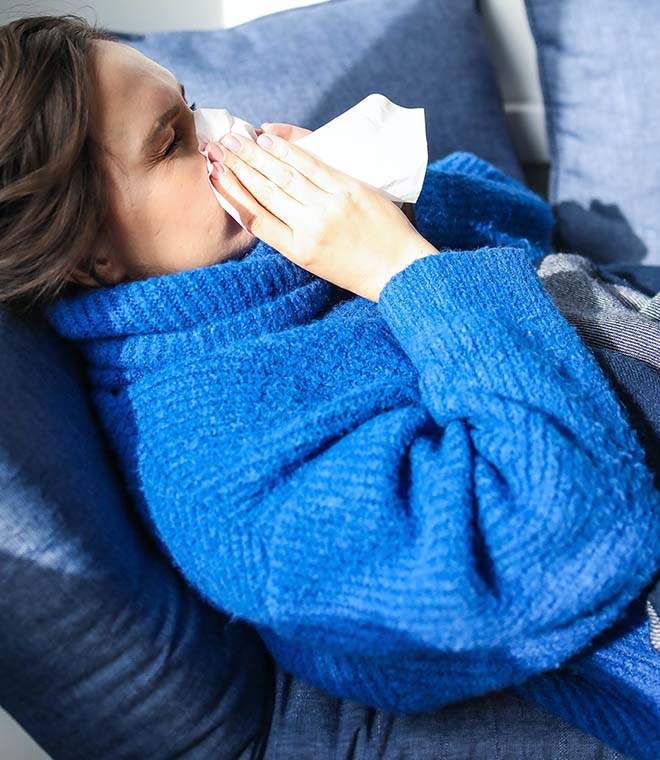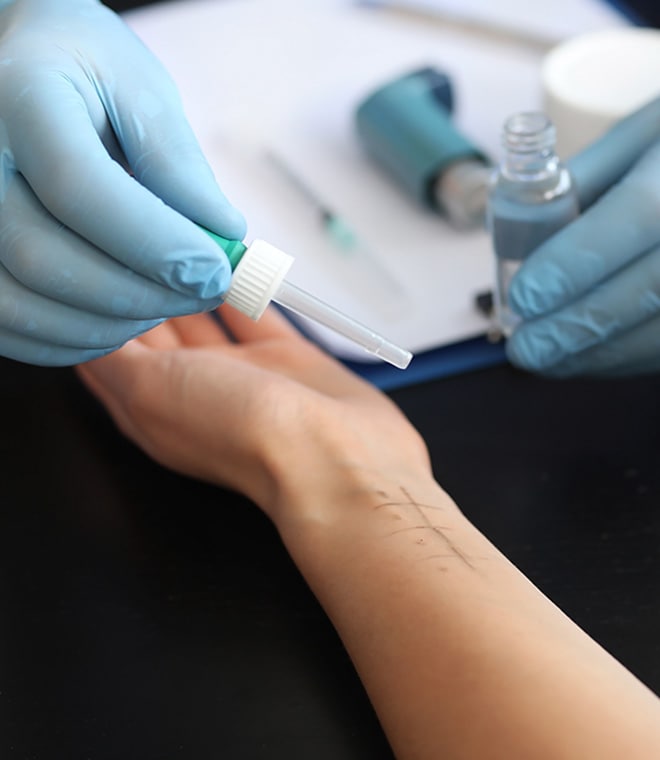Health
Can allergies cause headaches?
By Sanjay “Jay” Patel, DO | Allergy & Immunology Aug 16, 2024 • 6 min
Approximately 96% of people will experience at least one headache during their life. Headaches can arise from a variety of causes, including allergies.
The connection between allergies and headaches
Allergies are associated with two kinds of headaches: sinus headaches and migraines.
- Sinus headaches: A sinus headache occurs when the hollow cavities behind the face called the sinuses become blocked or inflamed, leading to a rise in pressure. If you have allergies, your immune system triggers an inflammatory response when your nasal passages come in contact with allergens that you’re sensitive to. When this inflammation occurs in the sinuses or nasal passages, pressure may increase and give rise to a sinus headache.
- Migraines: The causes of migraines aren’t fully understood, but for many people, they occur in response to triggers. In some individuals, the series of changes that take place in the body following an allergic response can trigger a migraine headache. However, primary migraines are usually not a result of allergic reactions.
Symptoms of allergy headaches
Pain and other symptoms from an allergy-induced headache vary depending on the type of headache. With a sinus headache, you’re likely to feel pain and/or pressure in one or more of the following locations:
- Behind your cheekbones
- Behind your eyes
- Behind the bridge of your nose
- In your forehead
Migraine symptoms include:
- Throbbing or pulsating pain on one or both sides of the head
- Sensitivity to light, sound and/or smells
- Vomiting and nausea
- Visual problems, such as blind spots or flashes of light
- Difficulty speaking
- Tingling on one side of the face or in an arm or leg
Along with a sinus headache or migraine, you may have other allergy symptoms, such as:
- Nasal congestion
- Itchy and/or watery eyes
- Itching of the nose and/or throat
Treating headaches and allergies
If you experience headaches due to allergies, your healthcare provider can recommend a treatment plan to manage your symptoms. Treatments will usually involve addressing the discomfort associated with headaches while also controlling your allergy symptoms to make headaches less likely to occur in the future.
1. Headache treatments: For sinus headaches, your healthcare provider may recommend:
- Decongestant medications to reduce inflammation in the sinuses
- Steroid medications to decrease inflammation
- Over-the-counter pain relievers to alleviate headaches
- Antibiotics if the sinus headache is caused by an infection
Healthcare providers typically prescribe medications to treat migraines. You may be advised to take a nonsteroidal anti-inflammatory (NSAID) medication, like ibuprofen or naproxen, or a prescription medication, to ease migraine pain when it occurs. Prescription drugs for migraine relief include:
- Dihydroergotamine (Migranal, Trudhesa)
- Gepants, such as rimegepant (Nurtec ODT) and ubrogepant (Ubrelvy)
- Lasmiditan (Reyvow)
- Triptans, such as rizatriptan (Maxalt, Maxalt-MLT) and sumatriptan (Imitrex, Tosymra)
- Zavegepant (Zavzpret)
In addition, your healthcare provider may prescribe medications to reduce the frequency of migraines. These drugs include:
- Antidepressants, such as amitriptyline (Elavil, Vanatrip)
- Anti-seizure drugs, such as topiramate (Topamax, Qudexy)
- Atogepant (Qulipta)
- Beta-blockers, such as metoprolol (Lopressor) and propranolol (Inderal, InnoPran), Hemangeol)
- Calcium channel blockers, including verapamil (Verelan, Calan)
- CGRP monoclonal antibodies, such as Erenumab-aooe (Aimovig), fremanezumab-vfrm (Ajovy), galcanezumab-gnlm (Emgality) and eptinezumab-jjmr (Vyepti)
- Rimegepant (Nurtec ODT)
2. Allergen exposure reduction: Reducing your exposure to allergens can help reduce allergy symptoms. Your healthcare provider may order skin and/or blood tests to determine what you’re allergic to and then advise you on how to lessen your exposure to these allergens. For example, you may be advised to stay indoors when pollen counts are high and wear a mask outside if you’re allergic to tree, grass or weed pollens.
3. Medications: Allergies can often be managed with over-the-counter antihistamine medications, which interfere with the activities of the immune system's chemical histamine. Over-the-counter oral antihistamines include:
- Cetirizine (Zyrtec)
- Fexofenadine (Allegra)
- Loratadine (Alavert, Claritin)
- Levocetirizine (Xyzal)
If your allergies frequently cause sinus headaches, your healthcare provider may advise you to take an over-the-counter antihistamine and decongestant medication, such as:
- Cetirizine and pseudoephedrine (Zyrtec-D 12 Hour)
- Fexofenadine and pseudoephedrine (Allegra-D)
- Loratadine and pseudoephedrine (Claritin-D)
Nasal sprays are another option for over-the-counter allergy relief. Options include:
- Azelastine (Astepro), an antihistamine
- Budesonide (Rhinocort AQUA), a steroid
- Fluticasone (Flonase), a steroid
- Triamcinolone (Nasacort AQ), a steroid
- Mometasone (Nasonex), a steroid
If over-the-counter allergy medications don’t fully relieve your allergy symptoms, your healthcare provider may prescribe an oral antihistamine, an antihistamine nasal spray or other medications.
Additionally, nasal saline rinses can be a helpful adjunct to therapy and can help clear the sinuses, reducing pressure and improving symptoms.
4. Immunotherapy: Healthcare providers may recommend immunotherapy for long-term allergy treatment. Immunotherapy involves desensitizing the immune system to allergens by exposing the body to small amounts of these substances. You may receive immunotherapy sublingually or via injections.
Updated August 2024.
Sources:
- https://acaai.org/allergies/symptoms/headaches/
- https://www.aaaai.org/tools-for-the-public/conditions-library/allergies/headaches-connected-to-allergies-and-sinus-problem
- https://my.clevelandclinic.org/health/diseases/9641-sinus-headaches
- https://americanmigrainefoundation.org/resource-library/allergies-and-migraine-how-do-they-affect-you/
- https://www.amjmed.com/article/S0002-9343(17)30932-4/fulltext
- https://www.mayoclinic.org/diseases-conditions/migraine-headache/symptoms-causes/syc-20360201#:~:text=A%20migraine%20is%20a%20headache,sensitivity%20to%20light%20and%20sound.
- https://my.clevelandclinic.org/health/drugs/19457-amitriptyline-tablets
- https://www.mayoclinic.org/diseases-conditions/allergies/in-depth/allergy-medications/art-20047403
- https://www.aaaai.org/tools-for-the-public/conditions-library/allergies/triamcinolone-nasal-spray
- https://www.asteproallergy.com/
- https://www.merckmanuals.com/professional/ear-nose-and-throat-disorders/nose-and-paranasal-sinus-disorders/sinusitis
- https://acaai.org/allergies/symptoms/headaches/
- https://americanmigrainefoundation.org/resource-library/sinus-headache/
- https://my.clevelandclinic.org/health/treatments/25146-tricyclic-antidepressants



